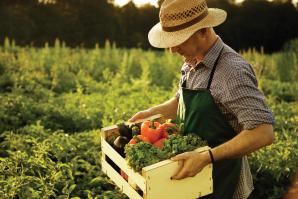Remember comedian Rodney Dangerfield’s famous catchphrase, “I don’t get no respect?”
I’m reminded of that quip when I think about the status of agriculture in California, a state that each year produces more than $36 billion worth of food and fiber and generates another $100 billion in related activities. For every $1 billion in sales, California agriculture provides about 18,000 jobs.
Yet, somehow we ignore the soil we stand on and instead get caught up in new, glitzy areas of economic development — green technology or biosciences, for example. That attitude is puzzling here in the Central Valley, which by itself leads the nation in agricultural production.
During these years of economic recession, agriculture in our region has continued to grow in dollars and in the use of emerging technologies. Today, it provides a quarter of all private-sector jobs in the Sacramento and San Joaquin valleys.
While many of us have ignored it, agriculture has developed into an increasingly sophisticated industry. New technology allows plant breeders to use genomic techniques to produce plants that use less water or even grow in salt water, and neutraceuticals (foods that provide health benefits), such as cooking oils that help suppress asthma.
In the fields, farmers have remote systems to monitor moisture and nutrient levels and then receive reports on smart phones. They can also make the most of their acreage by precisely mapping fields using new GPS-equipped production and harvesting equipment.
So instead of searching for how our region can become a center for the next “big” technology, why aren’t we doing everything we can to support and expand our role as a hub for ag tech?
There are challenges in developing the industry, to be sure. Agriculture has a reputation for being slow to change and tends to be a low-margin business.
Even more complex are the public policy challenges: how to stop urban encroachment on fertile farmland and how to promote sane water policies that protect our environment and give farms adequate and stable supply.
But these challenges are no greater than those we face in developing other complicated new technologies that often don’t offer the existing economic base we have in agriculture.
Thankfully, some smart, creative people are beginning to see and support the “new” agriculture as a major economic driver for our region. Among the most promising is Grow California, a new nonprofit that aims to match ag innovators and entrepreneurs with capital, expertise and customers. They are trying to identify companies with game-changing products, from software to irrigation to processing.
As always, UC Davis is a mainstay for the industry, providing research, training, technology transfer and, increasingly, under its new chancellor, a focus on leading economic development as well.
Now the rest of the region’s leaders need to line up behind this effort. We need not abandon our efforts to develop our region’s expertise in areas like clean technology and the biosciences. But, we absolutely do need to put agriculture on the short list of the area’s most promising economic opportunities. There is no reason why, a decade from now, our region shouldn’t be a center for agricultural technology the way Silicon Valley is a hub for computer and Internet technology. In fact, maybe going back to our roots is the surest path to a promising economic future.
Recommended For You
Growing Out of Recession
Leveraging ag will boost the region
Despite the general doom and gloom of our state’s current economy, there are a few bright spots that may be going unnoticed.

Eat it Up
Why you should salivate over Sacramento’s farm-to-fork mantra
In October of last year, Sacramento Mayor Kevin Johnson declared Sacramento the “Farm-to-Fork Capital of America,” presenting the city with a long-term opportunity to build a distinct brand identity that could help the region attract and retain citizens, conventions, tourists and entrepreneurs. It’s especially valuable because a strong regional identity gives energy to the economic engines that make cities successful. Anyone needing proof can look directly to Austin, Texas.


